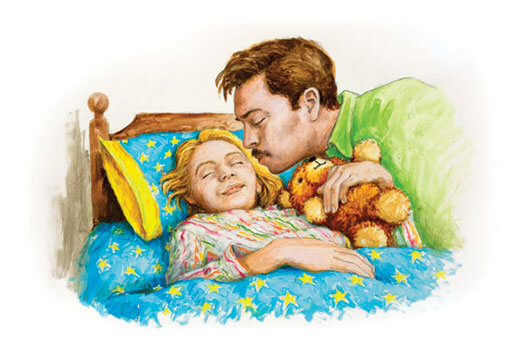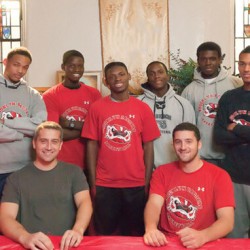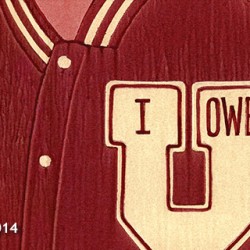News
“Good news and bad news,” Dad said. “Which do you want first?”
I was standing in the Wellfords’ kitchen. I had been a nanny for their four children since I moved from Wisconsin to Brooklyn, New York. I was washing the dishes, the wet phone resting between my shoulder and chin. He always does this — makes up some good news in order to tell me what’s really going on. I told the kids to go into the living room and start their homework. I asked him to start with the good, as a slight swell ballooned in my throat. “I’m retiring,” he said. There was a pause. I let my silence answer him.
He inhaled, and said, “It’s the C-word again.” Here it was, that word, shrieking across Midwestern airwaves to this cluttered kitchen, to this slushy block in Brooklyn. After sixteen years of hiding, it had found me once more. Back then, when I was eleven, I barely spoke for a year. When I did, it was in the form of a whisper to my dad when he tucked me into bed at night. “I miss her,” I’d say. He’d hug me, leaving the scent of Old Spice on the side of my face and my neck. “Me, too,” he’d reply.
Before we lost her to ovarian cancer, my mother had a way about her that emanated light, positivity, and honesty. She was modest, didn’t wear flashy clothes, spoke softly, and believed strongly in the miracles that childhood gives us. During my childhood, she was my miracle. At the time I needed her most, she was there. After the winter of 1995, my friends had families who became families to me: mothers who mothered me, beds that held me, vans that took me to soccer practice. My aunts and uncles and grandparents were around to play cards with us, cook us meals, and to hug us when we needed someone to remind us of Mom.
My brother and sister, each several years older than me, dealt with our mother’s death with the solace of friends and cars, in their own dark basements of grief. Soon, they went away to college, leaving not just one enormous gap to fill, but three. The dishes sat on the counter for months at a time, the laundry heaped in piles, and the bright television stayed on mute, as my father and I walked around in a numb state, together. We built a two-person team to fight against the grief of losing wife and mother: the sun around which the world orbited. We grew into a rhythm, and each slow year that passed, we became more and more alive. When I was thirteen, I got my first period, started wearing bras and deodorant. Each time I had a birthday, he’d feign anger that his little girl was growing up. We went on ski trips and road trips and college visits. He met my boyfriends and took photos of me when I dressed up for prom. We went to a movie together every Sunday night. We were quietly best friends.
After college, I didn’t stay in Wisconsin — or any one place — for very long. I moved around and traveled to all corners of the world, sometimes for years at a time, making small spaces for myself here and there. I used a variety of foreign currency, baht and reais and pounds, to call him long distance. Our conversations were short, the trans-Pacific and trans-equatorial connections always cutting us off.
That evening, as I stood in that Brooklyn kitchen, Dad explained that surgery was scheduled for a month away. After we hung up, I gathered the extra dishes and put them in the sink, shaking. One of the kids I had sent to the living room stepped slowly into the kitchen. She hugged my side. I wanted to stop crying and shield her from my pain, but she had already seen my tears. “Your parents will be home soon,” I said, wrapping my arms around her as if she were my own, scared, eleven-year-old self.
But there’s good news and good news. Dad’s surgery was successful, and two years later, he still has a clean bill of health. Today, he spends a lot of time with his new grandchildren. Now when I tell people that I lost my mom when I was young, they frown and touch my arm. “I’m so sorry,” they say. “Don’t be,” I reply. “I’ve gained more families than you can imagine since I lost her, and I’ve gained the best friend I will ever know.”
Lisa Mattingly ’07 is an assistant manager at an independent bookstore and lives in Burlington, Vermont.
Published in the Summer 2013 issue




Comments
Kai Williams June 19, 2013
Lisa, this is beautiful! I love your writing and learning more about you through it.
John Chamberlain June 19, 2013
Lisa knows there’s a special space in my heart … waiting to be filled with her first novel. As soon as she flips off all those author’s ghosts laughing at her every day from the shelves of that book store … she’ll whip off her 1st of many great works of words !!’